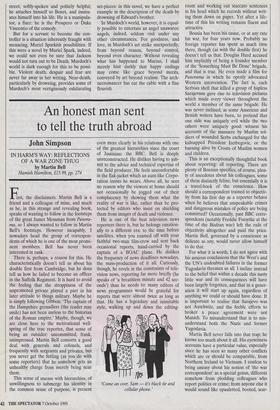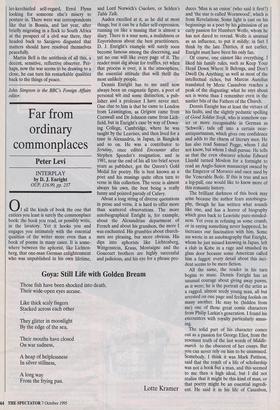An honest man sent to tell the truth abroad
John Simpson
IN HARM'S WAY: REFLECTIONS OF A WAR ZONE THUG by Martin Bell Hamish Hamilton, £15.99, pp. 274 Est, the disclaimers. Martin Bell is a friend and a colleague of mine, and much as he, in this strange and revealing book, speaks of wanting to follow in the footsteps of the great James Mossman from Panora- ma, so I always wanted to follow in Martin Bell's footsteps. However incapably, I nowadays head the group of correspon- dents of which he is one of the most promi- nent members. Bell has never been interested in rank.
There is, perhaps, a reason for this. He characteristically doesn't tell us about his double first from Cambridge, but he does tell us how he failed to become an officer in the Suffolk Regiment. It is hard to avoid the- feeling that the stroppiness of the unpromoted private played a part in his later attitude to things military. Maybe he is simply following Gibbon: 'The captain of the Hampshire grenadiers (the reader may smile) has not been useless to the historian of the Roman empire.' Maybe, though, we are close here to the motivational well- spring of the true reporter, that sense of being an outsider: uncommitted, frank, unimpressed. Martin Bell consorts a good deal with generals and colonels, and frequently with sergeants and privates, but you never get the feeling (as you do with some reporters) that he somehow gets an unhealthy charge from merely being near them.
This sense of unease with hierarchies, of unwillingness to submerge his identity in the common sense of purpose, is present even more clearly in his relations with one of the greatest hierarchies since the court of Justinian: the BBC. Bell is deeply unreconstructed. He dislikes having to sub- mit to the advice and technical expertise of the field producer. He feels uncomfortable in the flak-jacket which an aunt-like Corpo- ration insists he wears. Above all, he sees no reason why the viewers at home should not occasionally be jogged out of their complacency by showing them what the reality of war is like, rather than be pro- tected by editors who insist on shielding them from images of death and violence.
He is one of the best television news reporters there is, but he belongs emotion- ally to a different era; to the time before satellites, when you roamed off with your faithful two-man film-crew and sent back occasional reports, hand-carried by the captain of a BOAC plane. He dislikes the frequency of news deadlines nowadays, the mass-production of it all. Curiously, though, he revels in the constraints of tele- vision news, reporting far more briefly (he speaks of 'a breathless minute and 42 sec- onds') than he needs to: many editors of news programmes would be grateful for reports that were almost twice as long as that. He has a legendary and inimitable style, walking up and down the editing- 'Come on over, Sam — it's black tie and cellular phone.' room and working out staccato sentences in his head which he records without writ- ing them down on paper. Yet after a life- time of this his writing remains fluent and attractive.
Bosnia has been his cause, or at any rate his war, for four years now. Probably no foreign reporter has spent as much time there, though (as with the double first) he doesn't tell us that. Douglas Hurd accused him implicitly of being a founder member of the 'Something Must Be Done' brigade, and that is true. He even made a film for Panorama in which he openly advocated Western intervention. The fact is, each Serbian shell that killed a group of hapless Sarajevans gave rise to television pictures which made every viewer throughout the world a member of the same brigade. He was never inclined, as some American and British writers have been, to pretend that one side was uniquely evil while the two others were uniquely good: witness his accounts of the massacre by Muslim sol- diers of wounded Serbs exchanged for the kidnapped President Izetbegovic, or the burning alive by Croats of Muslim women and children.
This is an exceptionally thoughtful book about reporting: all reporting. There are plenty of Bosnian specifics, of course, plen- ty of anecdotes about his colleagues, some of them distinctly feline, but essentially it is a travel-book of the conscience. How should a correspondent trained to objectiv- ity from his first day as a reporter behave when he believes that unspeakable crimes and dangerous mistakes of policy are being committed? Occasionally, past BBC corre- spondents (notably Freddie Forsythe at the time of the Biafran war) left the rails of objectivity altogether and paid the price. Martin Bell, governed by a conscience as delicate as any, would never allow himself to do that.
For what it is worth, I do not agree with his anxious conclusions that the West's and the UN's undoubted failures in the former Yugoslavia threaten us all. I incline instead to the belief that within a decade this nasty little war and its consequences will have been largely forgotten, and that in a gener- ation it will start up again, regardless of anything we could or should have done. It is important to realise that Sarajevo was not Auschwitz, and the feeble efforts to broker a peace agreement were not Munich. To misunderstand that is to mis- understand both the Nazis and former Yugoslavia.
Martin Bell never falls into that trap; he knows too much about it all. His eyewitness accounts have a particular value, especially since he has seen so many other conflicts which are or should be comparable, from Northern Ireland to Vietnam. I confess to being uneasy about his notion of 'the war correspondent' as a special genus, different somehow from plodding colleagues who report politics or crime; from anyone else it would sound like epauletted, booted, scar- let-kerchiefed self-regard, Errol Flynn looking for someone else's misery to posture in. There were war correspondents like that in Bosnia, and last year, after briefly migrating in a flock to South Africa at the prospect of a civil war there, they headed back to Sarajevo disgusted that matters should have resolved themselves peacefully.
Martin Bell is the antithesis of all this, a decent, sensitive, reflective observer. Per- haps, now the war seems to be drawing to a close, he can turn his remarkable qualities back to the things of peace.
John Simpson is the BBC's Foreign Affairs editor.











































































 Previous page
Previous page